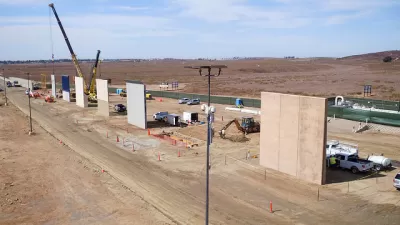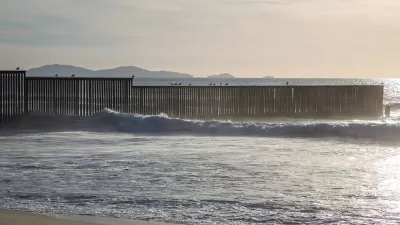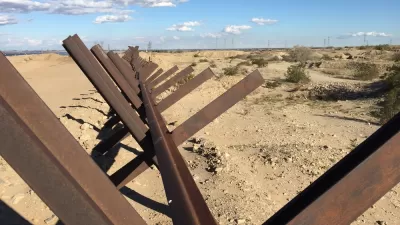In the drive to begin construction in New Mexico, the Trump Administration has bypassed dozens of federal environmental regulations.

This week, the Department of Homeland Security “announced that it would be waiving more than 30 laws, most of them environmental, to begin construction on a 20-mile-long stretch of bollard wall near the Santa Teresa port on the U.S.-Mexico border.”
Those laws include pieces of the legislation that make up the foundation of federal environmental protection, including the National Environmental Protection Act, the Clean Air Act, the Clean Water Act, and the Endangered Species Act.
Under the 2005 REAL ID Act, DHS Secretary Kirsten Nielsen has the right to waive any federal, state or local law to expedite construction in the border region, and this is not the first time she’s done so. Though the administration has not been particularly forthcoming about plans for the wall, the AP has reported that there are no plans for environmental review, and the Texas Observer has reported that at least part of it will bisect the Santa Ana Wildlife Refuge.
The potential for “ecological disaster,” however, has been established by both news organizations and the Army Corps of Engineers.
The Trump Administration has demonstrated a disregard for federal environmental regulation from the start, but this round of waivers also applies to parts of the American Indian Religious Freedom Act, Native American Graves Protection and Repatriation Act, and the National Historic Preservation Act.
FULL STORY: Trump administration waives over 30 laws to jumpstart border wall construction

Planetizen Federal Action Tracker
A weekly monitor of how Trump’s orders and actions are impacting planners and planning in America.

Congressman Proposes Bill to Rename DC Metro “Trump Train”
The Make Autorail Great Again Act would withhold federal funding to the system until the Washington Metropolitan Area Transit Authority (WMATA), rebrands as the Washington Metropolitan Authority for Greater Access (WMAGA).

DARTSpace Platform Streamlines Dallas TOD Application Process
The Dallas transit agency hopes a shorter permitting timeline will boost transit-oriented development around rail stations.

The Tiny, Adorable $7,000 Car Turning Japan Onto EVs
The single seat Mibot charges from a regular plug in about as much time as an iPad, and is about half the price of an average EV.

Supreme Court Ruling in Pipeline Case Guts Federal Environmental Law
The decision limits the scope of a federal law that mandates extensive environmental impact reviews of energy, infrastructure, and transportation projects.

Texas State Bills to Defund Dallas Transit Die
DART would have seen a 30% service cut, $230M annual losses had the bills survived.
Urban Design for Planners 1: Software Tools
This six-course series explores essential urban design concepts using open source software and equips planners with the tools they need to participate fully in the urban design process.
Planning for Universal Design
Learn the tools for implementing Universal Design in planning regulations.
Roanoke Valley-Alleghany Regional Commission
City of Mt Shasta
City of Camden Redevelopment Agency
City of Astoria
Transportation Research & Education Center (TREC) at Portland State University
US High Speed Rail Association
City of Camden Redevelopment Agency
Municipality of Princeton (NJ)





























